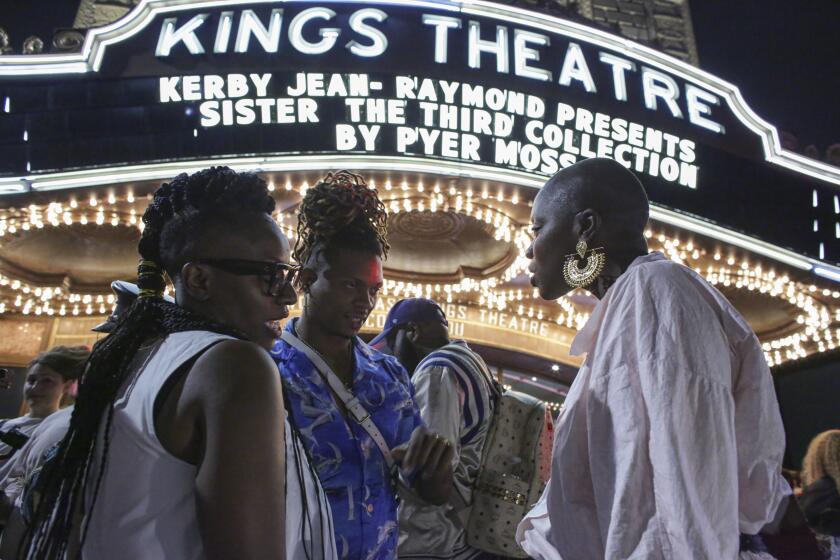New York Fashion Week: 5 spring and summer 2020 trends you should know about
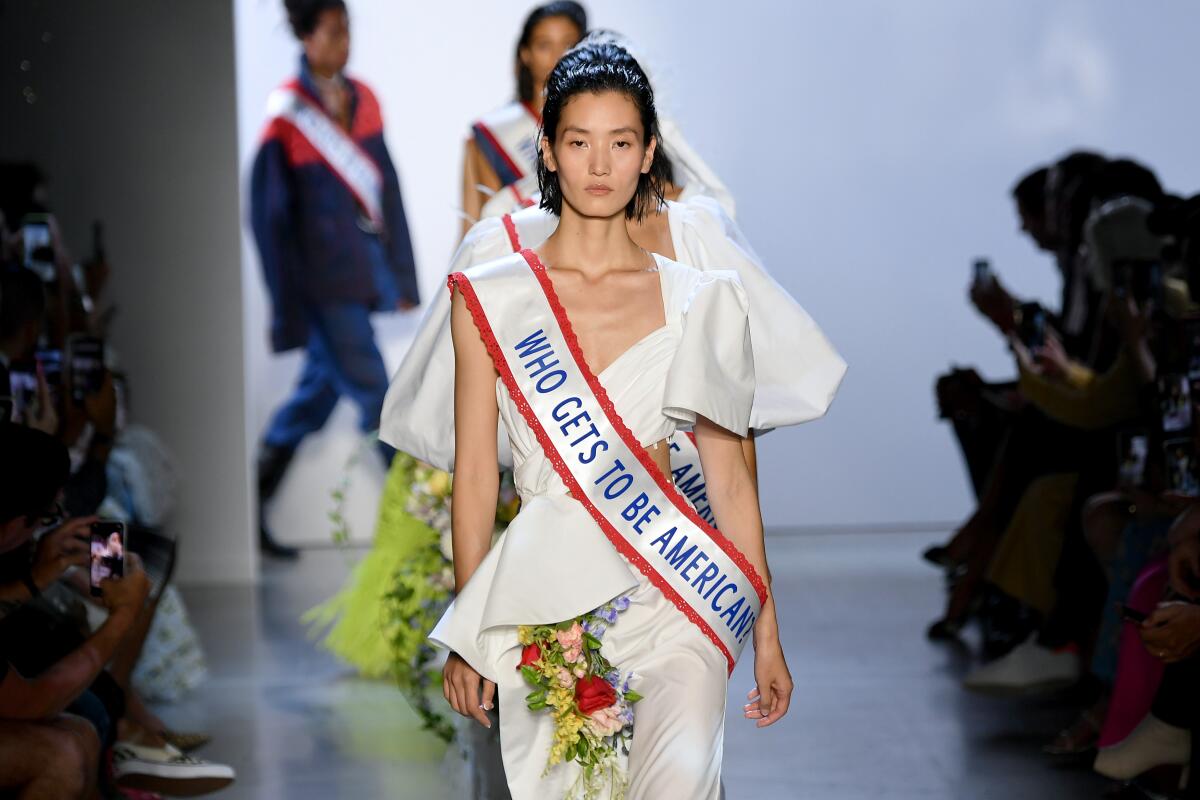
- Share via
NEW YORK — A sunny sense of optimism ran through the spring and summer 2020 collections presented here during New York Fashion Week, with labels providing the seeds of hope — in some cases literally — that brighter days for the country and our planet are just around the corner.
Although part of that feeling flowed naturally from the sunny hues and floral themes that traditionally characterize spring collections, there were a number of other trends, in silhouette, theme and color, that underscored the upbeat vibe. Here are five worth watching, including an optimistic appreciation of American sportswear.
Relaxed silhouettes
The strong-shouldered power suit that elbowed its way to center stage at the fall and winter 2019 runway shows is still very much in evidence (though, perhaps, softened ever so slightly), but the newness in the spring collections came by way of an abundance of super-relaxed, free-flowing and dialed-down options. Standouts here included Oscar de la Renta, where designers Fernando Garcia and Laura Kim catered to the caftan crowd with gauzy, V-necked, floor-grazing numbers trimmed in beaded fringe.
Also, there was Brandon Maxwell, who’s known for his red-carpet-worthy gowns (including Lady Gaga’s 2019 Met Gala scene-stealer) and who showed just how luxurious the classic American sportswear combo of a slouchy blazer or cardigan paired with blue jeans — ripped ones at that — can look in the right designer’s hands. (On a side note, Maxwell surprised attendees by sending his new menswear offerings down the runway alongside the women’s.)
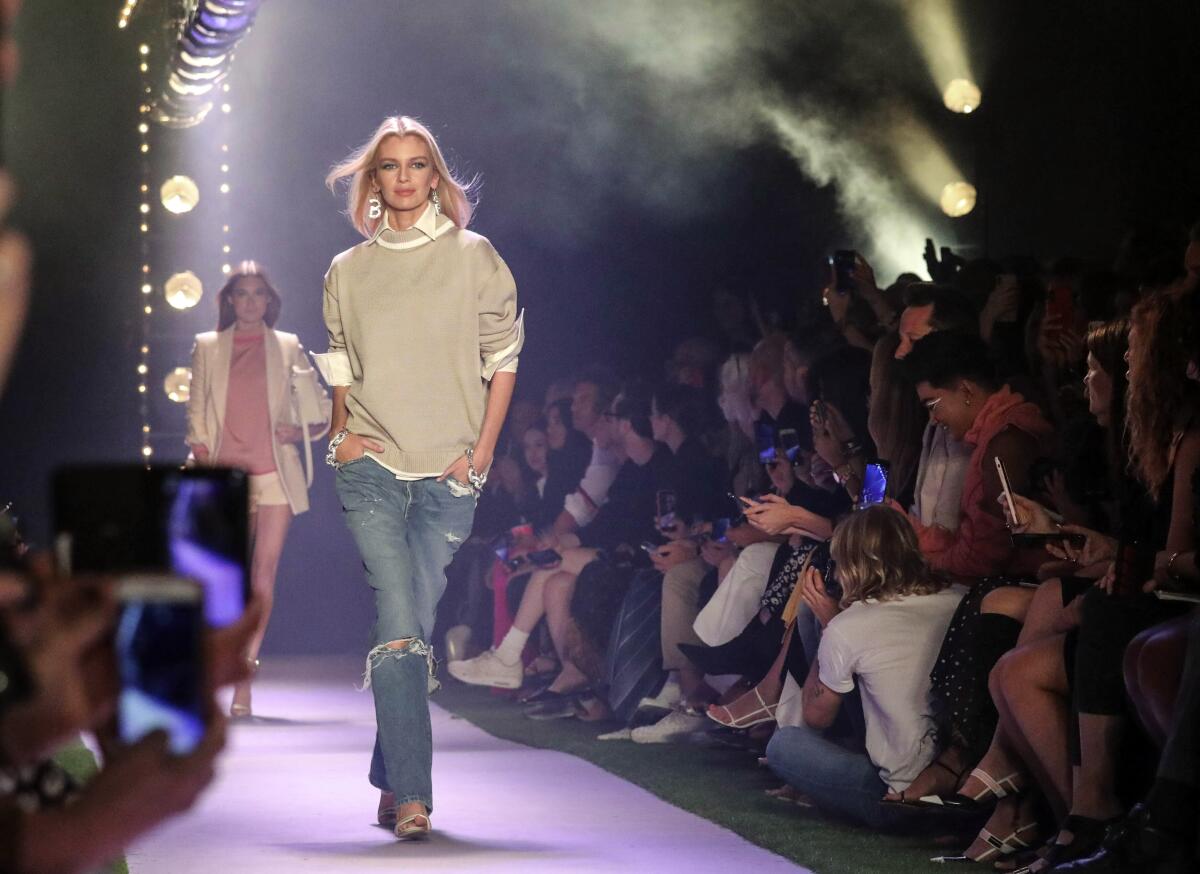
Two of this fashion week’s most memorable exercises in laid-back luxe came, perhaps not surprisingly, from L.A.-based labels. The first was Tom Ford, a designer whose runways are routinely filled with near-unobtainable glamour. This season he lured the fashion flock to the decidedly unglamorous venue of an out-of-service subway station to watch models parade the platform in T-shirts, leather motorcycle jackets and slouchy blazers, sleeves rolled back or pushed up, and paired with unfussy ball skirts or athletic-style short shorts.
The inspirational starting point, he said in the postshow notes, was a 1965 photo of Andy Warhol and Edie Sedgwick emerging from a manhole. “This season for me is about simplicity. Which is not to be confused with simple,” he wrote in the notes. “I think that it is a time for ease and, in that way, a return to the kind of luxurious sportswear that America has become known for all over the world.”
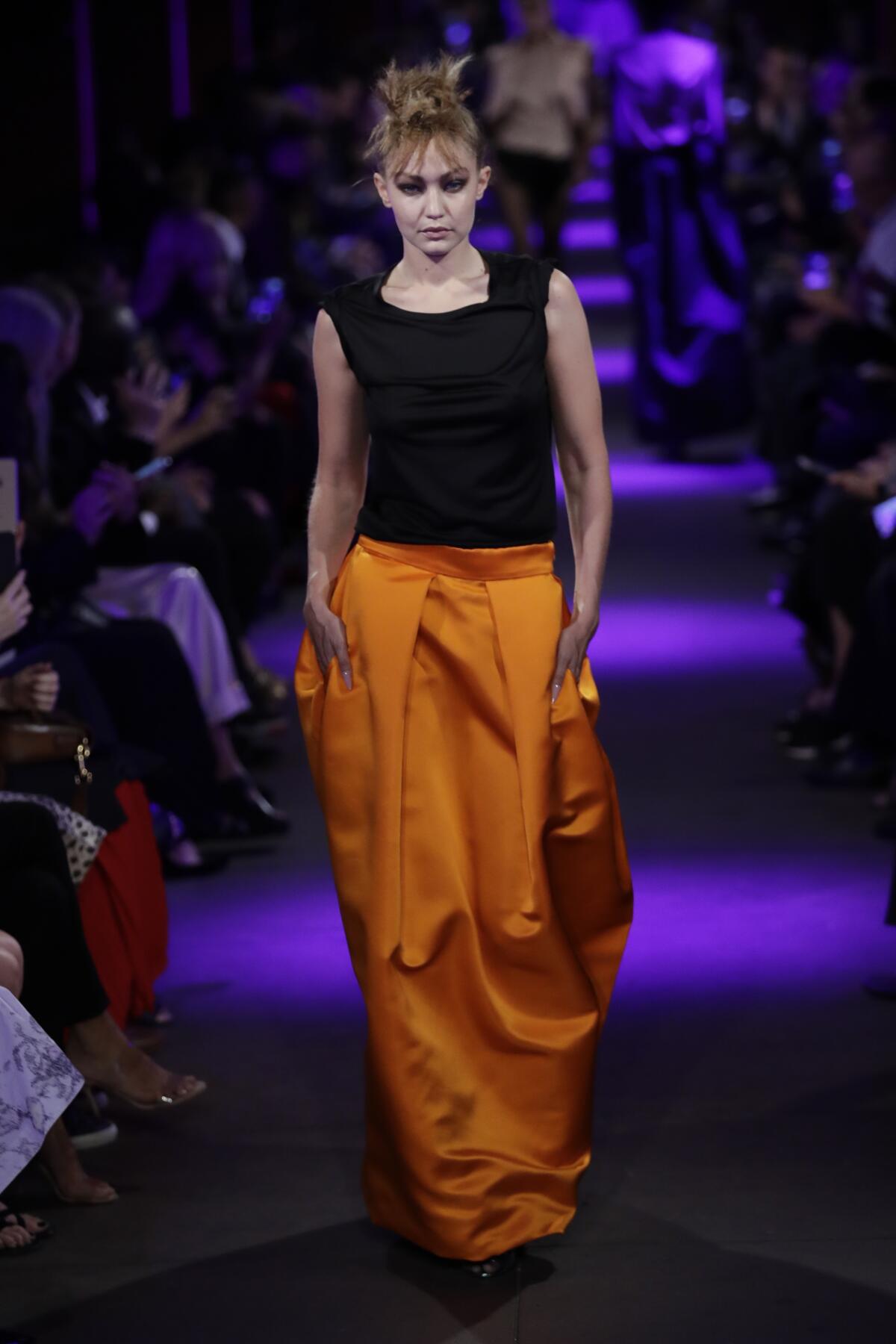
The second was Baja East, relaunched after a three-season New York Fashion Week hiatus with co-founder and creative director Scott Studenberg, using a New Year’s road trip to Joshua Tree National Park as the jumping-off point for a range of super-slouchy hoodies, slipdresses and athletic shorts in shades of sky blue and desert sunset red as well as billowy skirts and swim cover-ups printed with Joshua tree blooms.
Janelle Monáe dancing on tables at Ralph Lauren, Tommy Hilfiger at the Apollo and Tom Ford on the subway were a few of the moments that made for a memorable week.
Eye-catching belts
The wide, strappy or otherwise eye-catching belt turned out to be one of fashion week’s unexpected accessory stars. At Oscar de la Renta, wide leather belts were cinched with raffia-trimmed buckles. At Gabriela Hearst, the buckles were slabs of polished geodes, some the size of drink coasters.
Although most labels seemed content to keep the leather belt exactly where it’s always been — around the waist — that wasn’t the case at Proenza Schouler. Perhaps as part of the “firm commitment to unfettered creative experimentation” designers Jack McCollough and Lazaro Hernandez cited in their show notes, belts ranged harnesslike from the waist up and over the shoulders, forming a leather V with buckles at the shoulder joints on some looks, dangled unbuckled over one hip on others and seeming to play hide-and-seek with draped fabrics at the neck on still others.
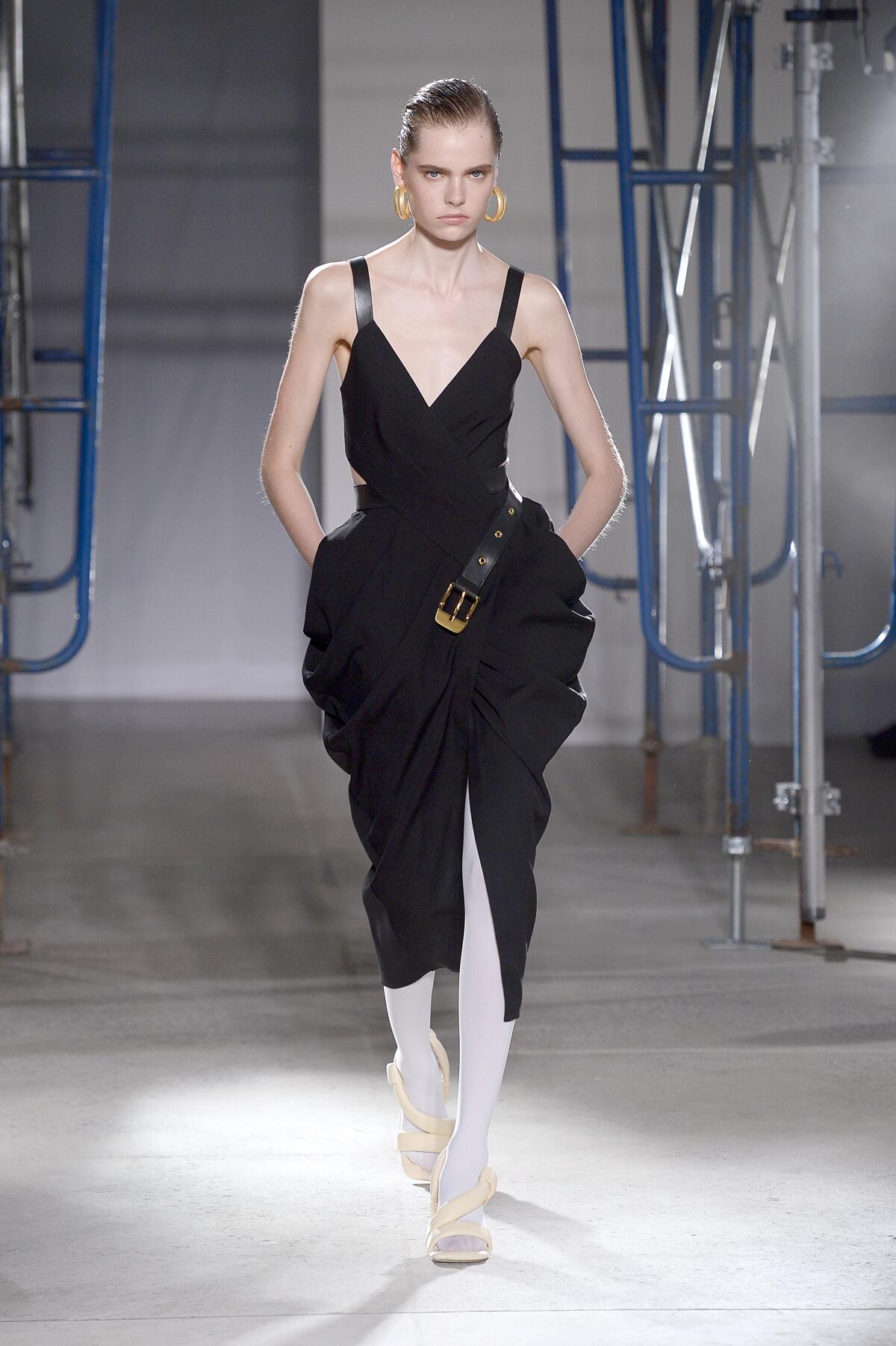
Even Proenza’s handbags got a healthy belting: Many were adorned with wide, black patent leather belts with chunky buckles that wouldn’t have been out of place on a Santa suit.
A peck of polka dots
Pattern-wise, the polka dot made an unusually strong showing in the spring and summer 2020 collections, sprinkled liberally through the collections of Tory Burch, Kate Spade New York and Carolina Herrera, to name just a few. A particularly deep bench of dots could be found in the Michael Kors Collection, in which the peppy pattern helped stoke the sense of “positivity and optimism” cited in the show notes by popping up on crepe de chine wrap dresses, puff-shoulder crop tops and asymmetric ruffle dresses in a collection that also included cheery fruit prints (cherries and lemons were spotted) and a boatload of nautical references (sailor caps and anchor motifs).
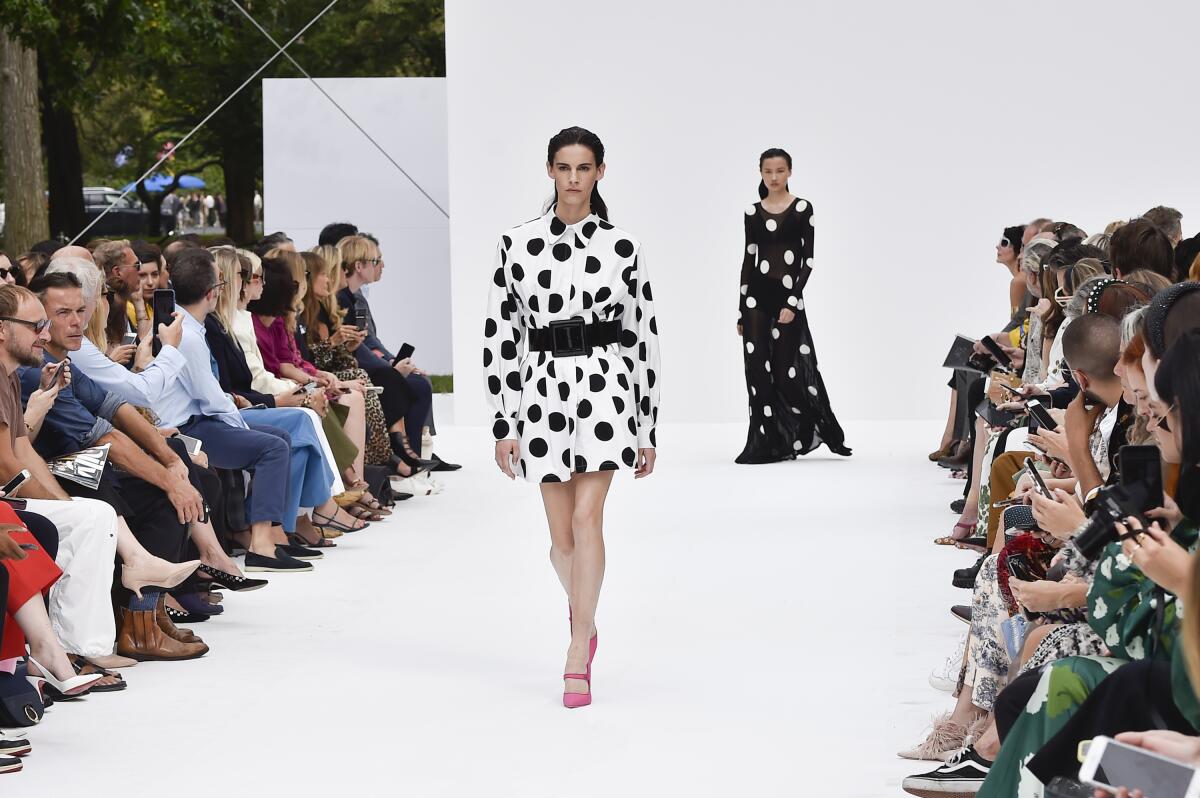
For L.A.’s BLDWN, which presented a Marfa, Texas-inspired collection here this week, smudgy gray polka dots cropped up on a woman’s T-shirt, inspired by the hide of an Appaloosa horse.
And, for those who can’t wait six months to start poppin’ dots, the see-now-buy-now Tommy X Zendaya collection that Tommy Hilfiger presented at the Apollo Theater in Harlem during New York Fashion Week has plenty of the polka pattern to go around.
A sea of green
From the Tomo Koizumi organza extravaganza early during the shows to Marc Jacobs’ emotional closer at the Park Avenue Armory on Sept. 11, it was shades of green that reigned supreme this New York Fashion Week.
Among the brands hoping you’ll exchange your green for theirs were Kate Spade New York, which offered forest-green skirt suits and leather shirtdresses — and, in a nice touch, show notes printed on paper that contained wildflower seeds, which attendees were encouraged to plant; and Coach 1941, which served up crewneck sweaters with intarsia-knit shrimp, snap-front shirtdresses and buttery leather jackets. (In addition, a packet of flower seeds was set at each seat for attendees to take home and plant.) Also, there was Brandon Maxwell’s collection with crop tops and miniskirts in mint green; and turtleneck sweaters, suits and bandeau-top dresses all in forest green.
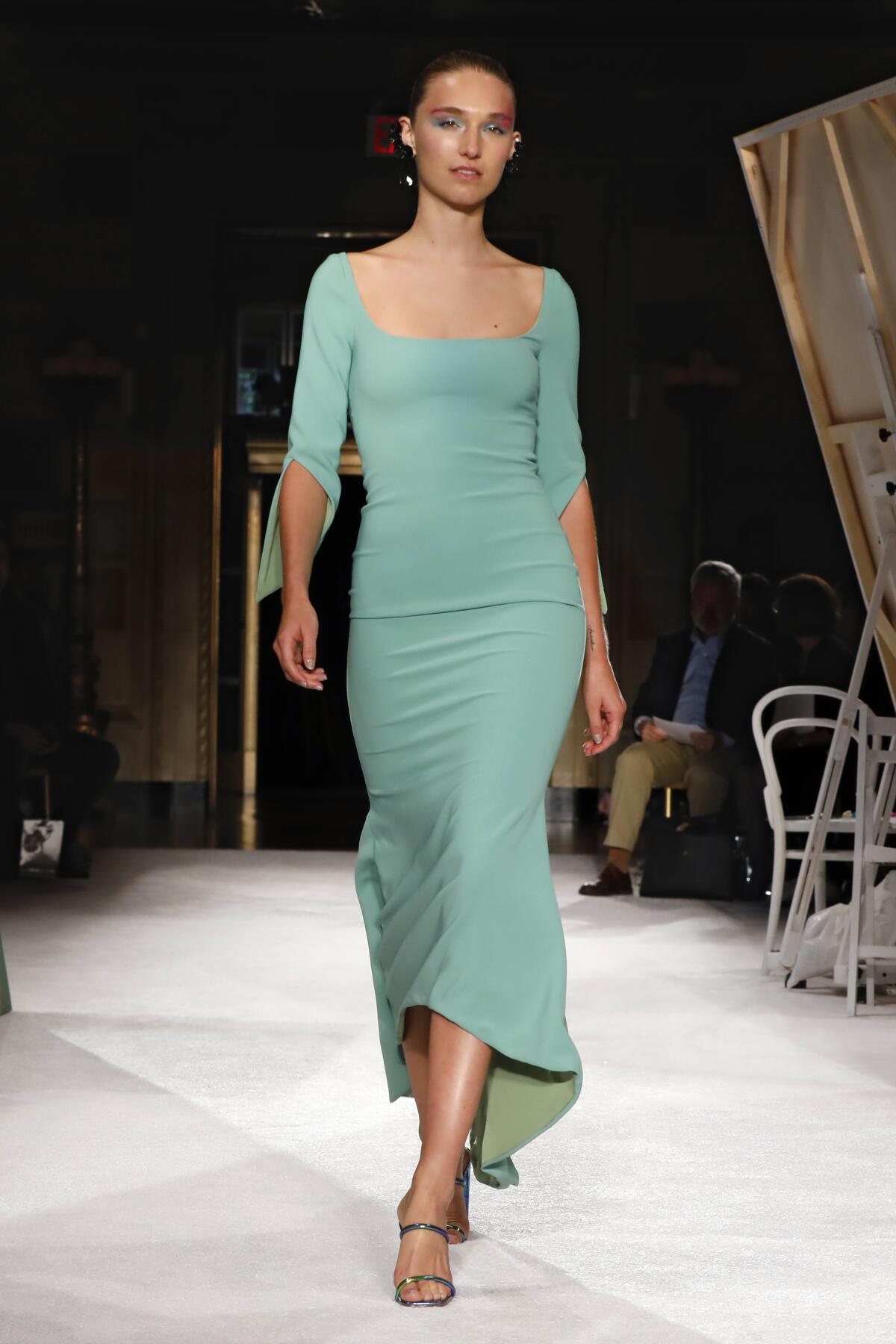
However, the designer most enthusiastically embracing the season’s verdant vibe had to be Christian Siriano, whose collection served up a sea of green in shades such as seafoam (wide-leg trousers, shimmery dresses), sage (flare-legged trousers, crystal-embellished blazers), forest (pleated strapless dresses, wide-legged trousers) and a metallic aqua (shorts, shawl-collar blazers and a belted tuxedo top paired with a layered tulle gown).
Meditations on America
Although the overt political statements of past New York Fashion Weeks were largely MIA (the notable exception being a “Vote or Die” T-shirt at the Pyer Moss show that included the words “for real this time”), several labels used the notion of America — and what it represents — as an inspirational starting point for their spring and summer collections. Two of the most notable to touch on the topic were Michael Kors Collection and Prabal Gurung, and although they started in the same place, they ended up in very different places.
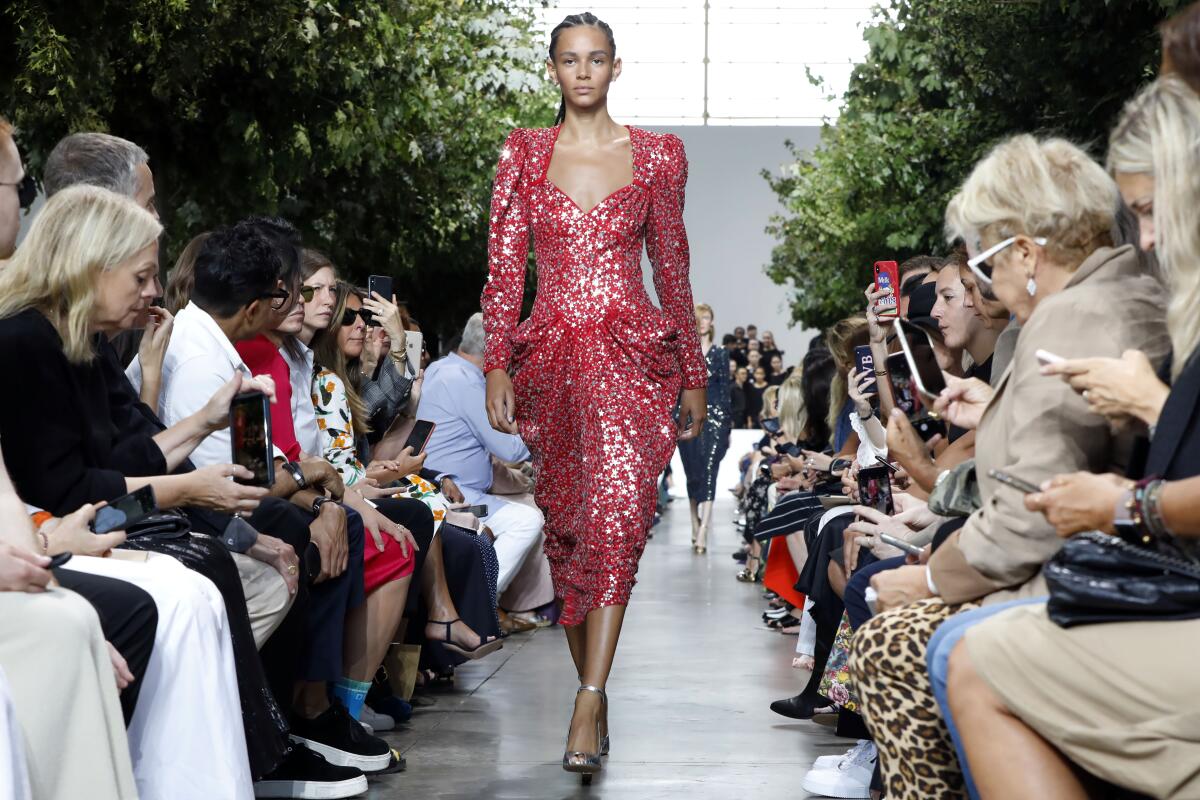
Kors’ took the more traditional route here, with a color palette heavy on red, white and (especially navy) blues. Stripes adorned handbags and trimmed tennis sweaters, and skirts, sweater vests and shoes were festooned with silver star embroidery. Dresses were spangled with star sequin embroidery. Combined with the naval motifs (anchor detailing, officer’s coats and sailor caps galore), the finale felt a bit like a 1950s-era Fourth of July parade.
The collection from Prabal Gurung, which marked his eponymous label’s 10th anniversary, came at the optimism of America from the point of view of someone born in Singapore and raised in Nepal.
“What has happened to me truly wouldn’t happen anywhere else in the world,” Gurung said backstage before his spring and summer 2020 men’s and women’s runway show. “I came to America. I wanted to work in fashion. I started my brand 10 years ago and I only became my whole complete self in America. I wanted to celebrate that optimistic spirit — especially right now when everything is so politically and culturally divisive.”
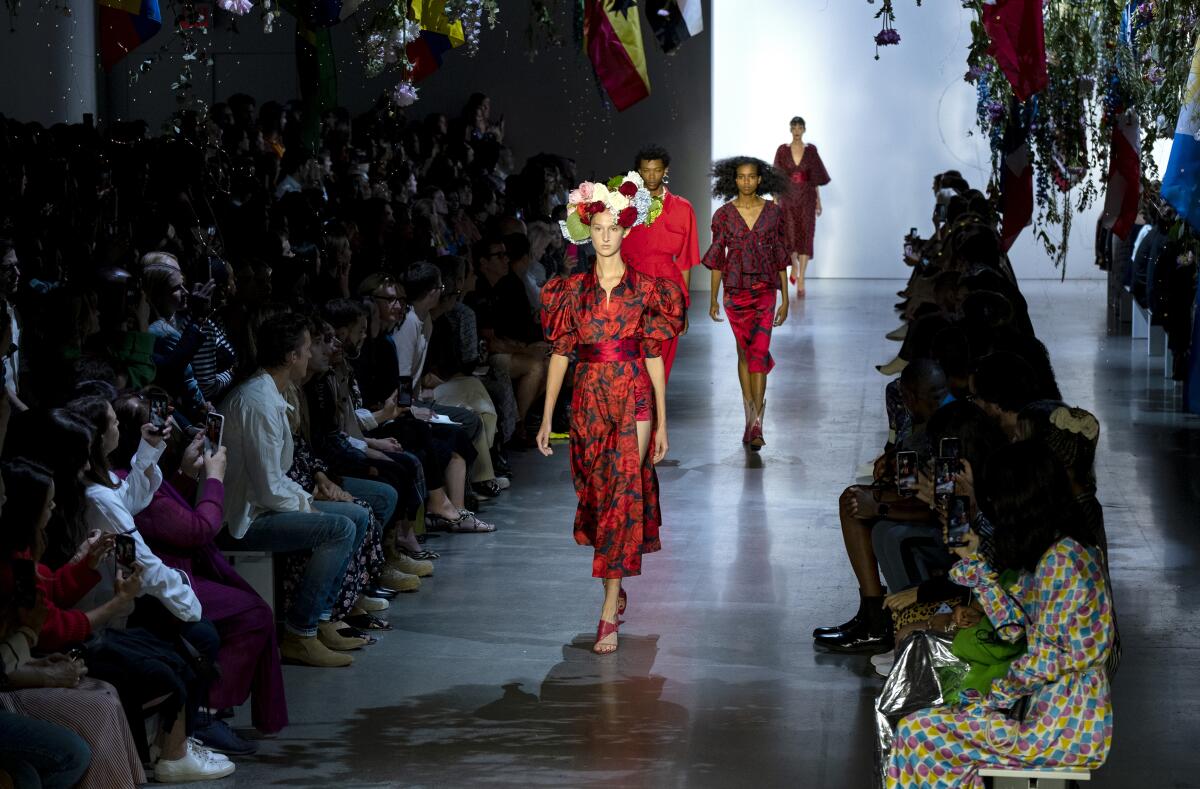
The question he asked in his show notes — “Who gets to be American?” — stemmed from a business meeting he had. “I’ve been here 20 years,” he said. “I’m an American citizen, and I’m in a meeting talking about what it means to be American, and one of the suits turns to me and says, ‘Well, how can you define America? You don’t look American.’ … That made me want to have the conversation — and to celebrate the American spirit through my lens.”
Gurung’s runway riff on America meant the white cotton shirting fabric of classic American sportswear used for button-front dresses, skirts and tops; denim, America’s favorite fabric, used for work jackets, overalls and dresses; and scraps of white fabric from his archives stitched together with blue thread as a nod to the patchwork origins of the U.S. citizenry.
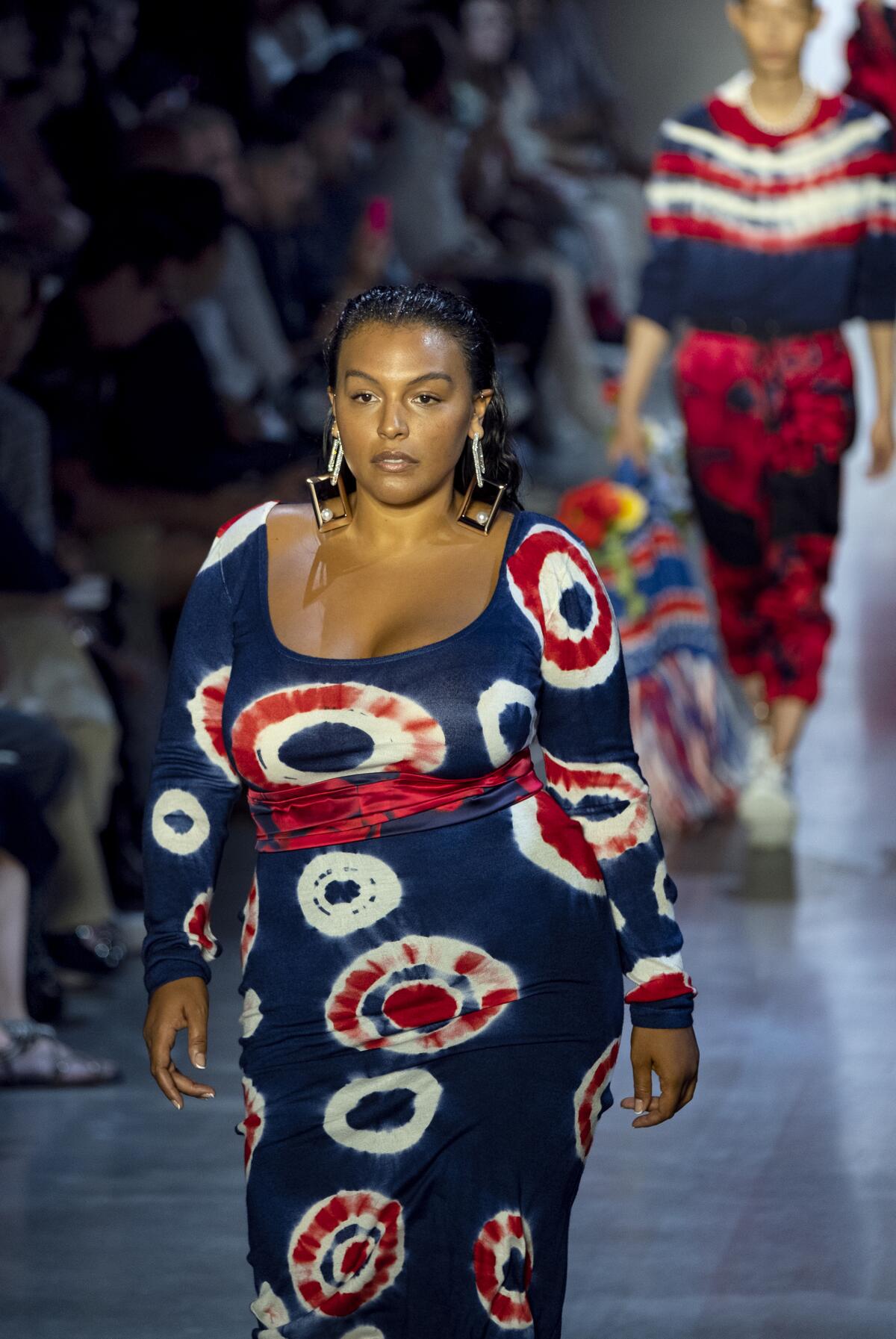
More subtle references came by way of a recurring rose motif — Gurung pointed out that the rose is the official flower of the United States — blooming on pieces throughout the collection as well as a range of tie-dyed dresses, T-shirts, tops and sweatpants inspired by a Nepalese childhood interacting with the American hippie contingent.
At the end of the show, when the models hit the runway for the finale, each was wearing a beauty-pageant-style sash emblazoned with “Who gets to be American?”
It’s a question well worth asking.
More to Read
Sign up for The Wild
We’ll help you find the best places to hike, bike and run, as well as the perfect silent spots for meditation and yoga.
You may occasionally receive promotional content from the Los Angeles Times.

